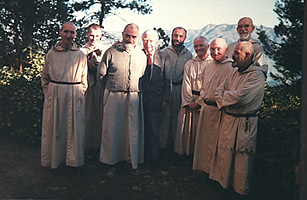
When the severed heads of seven French Trappist monks were found in a remote mountainous region of Algeria in May 1996, it was natural to assume the murders were the latest gruesome act by jihadists in their long-running and bloody campaign against the Algerian government. Thirteen years on, however, the victims’ families, church officials and the French and Algerian publics have been shocked by the revelation that the monks may have been killed as the result of a bungled Algerian military operation. According to testimony given by retired French general Franois Buchwalter as part of an official investigation in France, French and Algerian authorities covered up the mistake by pinning the massacre on the jihadists.
The disclosure comes weeks after a leak in a separate investigation into the deaths of 11 French naval engineers in a 2002 bomb blast in Pakistan. Initially blamed on Islamist extremists, the bombing, French investigators now believe, was likely the work of Pakistani military intelligence officials angry that France had stopped the payment of a kickback connected to a $1 billion submarine contract between Paris and Islamabad.
That such dramatic developments in two such sensitive cases should come now is probably no coincidence. Call them Exhibits A and B in the case to protect France’s legal system from President Nicolas Sarkozy’s reformist zeal. Sarkozy wants to do away with the post of independent investigating judge — a key feature of France’s legal system — and place control of criminal inquiries in the hands of politically appointed state prosecutors. Citing a small number of high-profile instances in which judges have overstepped their investigative and detention powers, Sarkozy says he wants to reform France’s inquisitorial justice system by moving it towards the more adversarial American and British model. French lawyers and judges are furious with the proposals, which they say will politicize the French system. “The intent of Sarkozy’s plan is clear: to put investigations back under political control by eliminating the magistrate and putting prosecutors in charge,” says Patrick Baudouin, who represents victims’ families in the monk case. “This case of the monks is the best example yet that once an independent judge is allowed to investigate, the ability of the rich, the powerful and the state to keep the truth covered up is reduced to almost nothing.”
Skeptics have long sniffed at the official Franco-Algerian version of how the monks were abducted and murdered. But Buchwalter’s statement — given to investigating magistrate Marc Trvidic, who also happens to be overseeing the Pakistan case — blows the biggest hole yet in the idea that the Armed Islamic Group killed the seven men. According to Buchwalter, an army intelligence official serving as military attach to France’s embassy in Algiers at the time of the killings, he was told by Algerian colleagues that the monks had died when an Algerian army helicopter patrolling an area south of the capital, Algiers, opened fire on what soldiers thought was a terrorist encampment. The monks were among the corpses discovered there. When Buchwalter reported that news to his superiors, he said, he was ordered to remain silent to protect French-Algerian relations. “There are a lot of aspects of the official story that just don’t stand up, including the fact that several alerts on the Algerian army’s responsibility were never followed up,” says a French counterterrorism official who confirmed to Time the existence of Buchwalter’s testimony after it was first reported by French daily Le Figaro. “Why were only the severed heads of the monks found and returned to France? If you can find the heads, you can find the bodies — unless there’s a reason someone doesn’t want the bodies to be found.”
An Incredible Tale
The story of the monks from the Tibhirine monastery — some 55 miles south of Algiers — has always been full of inconsistencies. A few weeks after the monks disappeared in late March 1996, a GIA statement claimed that the men had been grabbed so they could be exchanged for captured militants, a notion that perplexed terrorist experts more used to the GIA killing its enemies in well-planned strikes. Puzzlement grew when the GIA issued a second communiqu in May, saying that it had “slit the throats of the seven monks.” Some French officials suspect Algerian secret-service officials had actually staged the abduction to further demonize the GIA in European eyes. The follow-up plan to free the monks in a “rescue operation,” sources speculate, was ruined when unsuspecting regular-army forces attacked the suspected militants. Algerian leaders have emphatically denied all allegations. Read “Fighting Terrorism: Lessons from France.”